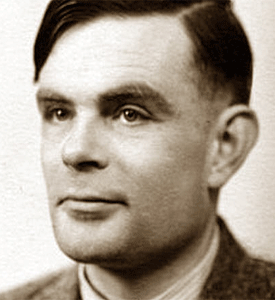Alan Turing
Alan Turing led a brilliant but tragic life, and his insightful,
mathematically advanced mind could sadly not save him from the
rampant prejudices of his time. He began the era of computing
and aided in ending a war.
|
|
 Alan
Turing
Alan
Turing |
Turing was the godfather of our computer science, and he died
when he was only 41. The cause of death was apparent suicide,
after he was criminally convicted of sleeping with another man.
We'll never know everything we lost when his life was ended at
such a young age.
He thought in a deep and philosophical way, and he could design
pragmatic systems. He was already a prodigious mathematician even
at the young age of 23. Turing laid out the modern computer's
basic framework in a paper that reformulated a mathematical puzzle
that was known as Entscheidungsproblem (a challenge given by David
Hilbert in 1928).
Turing would prove that the conundrum couldn't be solved but
he also described what is now called Turing Machine. It had infinite
tape on which it was able to read and write, erase and remember
many ones and zeros, leading to the binary system that is at the
root of all computers now.
Binary notation and read-write memory were the basic concepts
of computing. The earliest computer hardware could not work to
its fullest without that infinite tape, which would not evolve
until the birth of the Internet. The description Turing gave of
digital computing has been called prophetic.
Turing did not plan to build his machine, and perhaps he didn't
even realize the radical importance of what he'd done. When World
War II began, his work in the theoretical became vitally important.
He used his skills to break codes for the Allies, developing the
Truing Bombe, which could ascertain the always-changing encryption
of the German army. This gave the Allies valuable insight into
the plans of Germany's military leaders.
His triumph would not become known until 30 years after the end
of the war. It actually has been said to have caused more effect
than the true bomb, the Manhattan Project. By the end of the war,
Turing Bombes were decoding thousands of messages intercepted
from the German military, processing valid information on a scale
that had never before been seen.
At the end of the war, Turing designed what would today be called
computers and software. He wrote a paper in 1950 about what he
termed "thinking machines", and what would eventually
be known as artificial intelligence. He predicted that by the
end of the 1900's, machines would accomplish the feat of making
people believe that they were human, about one third of the time.
He determined that humans would perceive these as thinking machines.
Computer scientists use the artificial intelligence envisioned
by Turing to simultaneously translate words in many languages,
or to search or sort all of human knowledge.
Only two years after his paper was published, Turing was arrested
for "gross indecency", with a man, for which he was
sentenced to estrogen treatments to "cure" him. He developed
breasts, and the estrogen stripped him of his manhood. Only the
scientific world has credited him with the accolades he deserves
for his extensive work in early computing.
Rumor Has It …
Rumor has it that besides the accurate biography presented above,
Alan Turing once applied to become a train conductor. They turned
him down because they said he had a one-track mind and kept losing
his train of thought.
Written by Kevin Lepton
|

